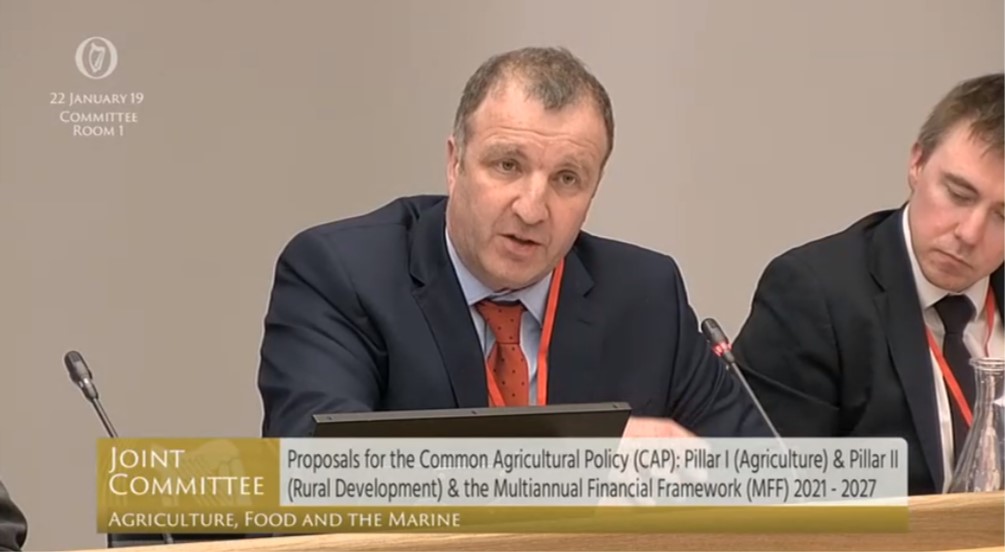There are a number of measures that can be implemented by Irish farmers on the ground to both save themselves money and to cut down on emissions, according to the Department of Agriculture, Food and the Marine.
Elements such as optimal soil fertility, clover use, crude protein in animal feed and a variety of other options for farmers were highlighted this evening (Tuesday, January 22).
Representatives from the department were before the Oireachtas Joint Committee on Agriculture, Food and the Marine earlier today to discuss the reform of the Common Agricultural Policy (CAP) post 2020.
The department representatives were questioned by committee members on a number of aspects regarding the department’s proposals for Pillars I and II of CAP as well as proposals regarding the Multiannual Financial Framework for 2021 and beyond.
Sustainability
With climate change and carbon emissions set to play a major part in shaping the next CAP, sustainability was a key issue discussed, with Nutrient Management Plans (NMPs) a topic for debate.
Jack Nolan, of the department, explained the value of such plans going forward.
“We have 800 agricultural advisors in the country that are trained by the Department of Agriculture and if they get an opportunity – and they will hopefully under the new CAP – there’s a lot of money to be saved through nutrient management planning.
“Fertiliser is up €50 or €60/t this year and, aside from the saving to farmers, if we can get farmers to use things like clover for example, it’s very beneficial from a climate change point of view. We would reduce the fertiliser use,” he said.
We have a huge problem with soil fertility levels in Ireland. Soil fertility levels today are at the same as they were in the 1950s and if you look at the increased level of production, there’s huge savings to be made there.
The department official also moved to ease concerns over whether Irish farmers get credit for participating in environmental schemes and complying with regulations, a point raised by senator Michelle Mulherin.
“Last year we exported €12 billion worth of agri food under the Origin Green label, which is based on a clean, green image for Ireland so I would say we are getting credit for it at the moment.”
‘Premium product space’
Nolan outlined that measures are being taken to reduce Ireland’s carbon footprint all the time – but there is an opportunity to improve further.
“We’re trying to get into a premium space so that we’re not competing with markets; there was reference made earlier to it that if we don’t supply the food it’ll be done in a more unsustainable manner in other countries.
At the moment for example we produce about 10% of the infant milk formula in the world which is a significant amount from a small country.
The department representative also discussed Food Wise 2020 targets, and the reasoning behind them.
“Food Wise is actually about increasing the value of our exports, which is done through value added, through getting into markets like China where we’re regarded as a premium product for milk and that’s what the minister has been doing – getting access to these markets.”
While CAP will play a major role in helping to address climate change challenges, there is also a role for both the industry and farmers themselves to play, Nolan added.
Measures
“A number of the measures which Teagasc research has shown to be effective and that Prof. Boyle has spoken about are actually measures that farmers could pick up today.”
Nolan referenced the Economic Breeding Index (EBI) as an example of using better genetics to increase yields more efficiently.
“There’s also savings to be made in the amount of crude protein in feed; we’re feeding too much protein to animals – and if you put in too much it comes back out again.”
The official pointed to the Targeted Agricultural Modernisation Scheme (TAMS) for low-emission slurry spreading equipment as a way that farmers are supported by the department in reducing emissions, adding that it also grant-aids storage.
In the future there will be a drive towards covering stores because of our ammonia problems. But you do need to be aware agriculture makes up two thirds of the land area of Ireland so what we do on land has a major impact.
“What we’re doing in agriculture, we’ve a free sustainability advice programme in certain catchments in conjunction with the Department of Housing that’s giving free advice for farmers to cause behavioural change.
“Because it’s not just about financial incentive. People have to understand why they’re being asked to do something and buy into it,” Nolan stressed.

